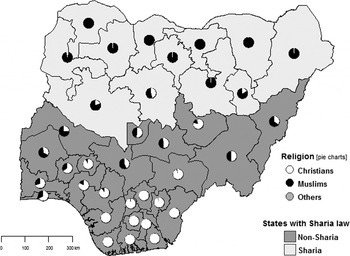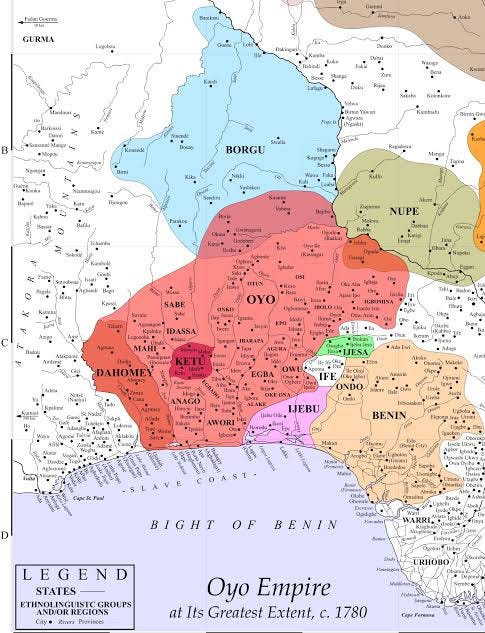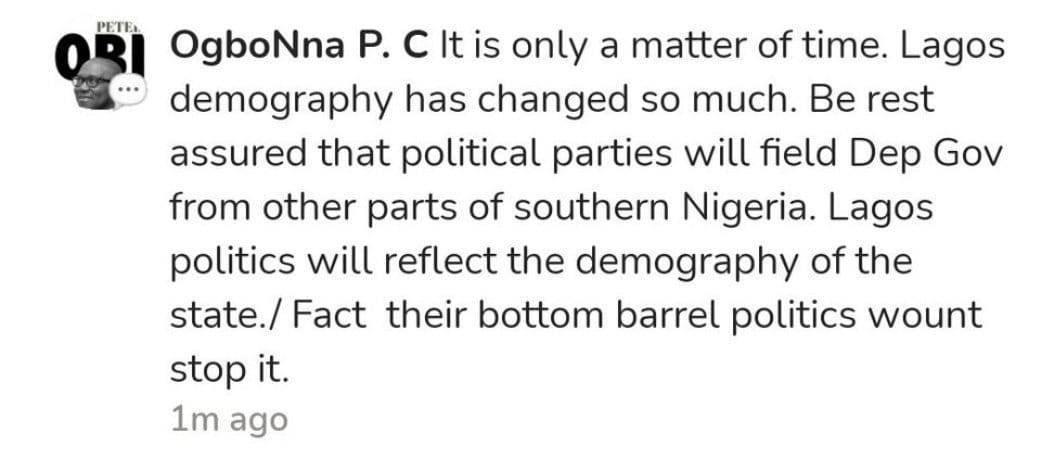Cold War in Nigeria and the Implications of 2023 Elections
Conflicts of Interests, History and (Geo) Political tensions amongst the constituent Ethnic Nations in the Nigeria lock-jam imposed by alien.
It's shouldn't be news that already amongst Ethnic Nationalities in Nigeria is a renewed “Cold war" influenced by Nigeria Political History and just concluded Nigeria's Presidential Election and focus is on Lagos in what we shall call: “The Scramble for LAGOS STATE”.
The presidential election, held on February 25, revealed the sharp ethnic, religious and demographic fault lines in Nigeria.
A brief history of Nigeria Political events
In the movement for Nigerian national independence, political parties led the way.
At the time of independence in 1960, four political parties were firmly established on a broad territorial basis. Each one incarnated a distinctive political idea.
National Council of Nigeria and the Cameroons (NCNC) stood for political democracy in its classical, individualistic form.
Action Group of Nigeria stood for federalist democracy to safeguard the rights of cultural communities.
Northern Peoples’ Congress (NPC) exemplified the modernization of traditional political authority; its radical opponent.
Northern Elements Progressive Union (NEPU) espoused egalitarian Kanorian democracy.
From 1951 to 1962, of these parties, three — NPC in the North, NCNC in the East, and the Action Group in the West — controlled their respective governmental regions. With the presence of a predominant linguistic group in each region — Hausa-Fulani in the North, Igbo (Ibo) in the East, and Yorùbá in the West — they commonly identified the major political parties with “ethnic” group interests misleadingly.
After the federal parliamentary election of 1959, the NCNC joined with the NPC to form a governmental coalition of convenience, while the Action Group assumed the burden of parliamentary opposition to the Federal Government.
The Action Group crisis of 1962, By the fall of 1963, Nigeria’s ill-fated “First Republic” had begun its fearful slide to disaster. In 1964, the federal coalition partners (NPC and NCNC) quarrelled over the results of a decennial census, which preserved the Northern Region’s edge in people counted over the rest of the country.
Following a mismanaged parliamentary election at the end of 1964, one that was partially boycotted by the NCNC and its allies, the NPC resumed control of the Federal Government. But the legitimacy of that government was gravely impaired in the southern regions. Confidently and defiantly, antiregionalists anticipated an Action Group victory in the Western Regional election of October 1965. This, they believed, would redress the overall political balance and force the NPC to reappraise its regionalist policies.
However, the party in control of the Western Regional government rigged the election. Three months of increasingly violent unrest in the Western Region culminated in the coup d’état of January 1966. At first, the Military Government was accepted with varying degrees of good will in all parts of the country. Hope turned into disillusionment and anger when the new regime, headed by an Igbo Major-General, threatened to impose a unitary form of government by decree. There followed an anti-Igbo army mutiny, the massacre of many persons of Eastern origin who were resident in the North, the Eastern (Biafran) secession of May 1967, and a 30-month civil war in which the secessionists were defeated.
In anticipation of the Biafran secession, the Federal Military Government abolished the existing regions and reorganized Nigeria into twelve states. This action, comparable in its historic significance to the amalgamation of Northern and Southern Nigeria in 1914 and the establishment of a federal form of government in 1954, had a dual purpose and effect. It was intended, first of all, to gain the loyalty of ethnic minorities in the secessionist East. It was also designed to project a national ideal that would help to rally Nigerians in all parts of the country to the cause of unity. The civil war destroyed regionalism as a political force.
Repeat of Press War between Zik led NCNC and Awolowo led AG is back as Twitter/Facebook and other social media platforms portraying the conflict as an inter-ethnic battle.
Why a “Cold War”?
Factors that may have led to the renewed “Cold War”:
Ethnicity: Majority of Igbo are disgruntled with Yorùbá on the basis of Yorùbá-Hausa/Fulani- Kanuri Political alliance (Buhari/Osinbanjo transition to Tinubu/Shettima) i.e. Yorùbá dominated ACN, ANPP, APGA and Conservative northern dominated CPC parties merger to from APC. Despite the Tinubu presidency as a personal ambition, it can't be separated from being Yorùbá, same as Peter Obi can't be separated from being Igbo. Many of these disgruntled people perceive Yorùbá as the “New Lord of the South”, sell-out, politically dominating Southern Nigeria.
PDP may be entrenched in SS and NC and SE is out of the game.
It's rumoured that Hausa-Fulani cold war affected the vote patterns in the presidential election such that many Hausa bloc went for Tinubu while Many Fulani bloc and Religious Conservatives went for Atiku.
Labour Party (LP) may become SE political bloc and then form merge with Northern conservative party in the future, maybe NNDP.
Religion: Peter Obi rode on anti-Muslim-Muslim sentiment, Pan Christianity and Igbo turn (awa lo kan) sentiment and self-proclaimed competency propped up by Powerful PR spearheaded by Influencers and EndSARS grievances against APC and Lagos in particular (even though he himself has no antecedents of having stood up against SARS or the movement in 2020).
Therefore, the votes he got reflects the reality and demography of Christian dominated Middle belt and Southern Nigeria, however, the problem is Yorùbá Christians in general didn't buy into such and this reflected in votes of Èkìtì and Ondo state as both predominantly Christian Population. Therefore, they rather regarded ethnicity has greater factor than religion, perhaps, this is typical Yorùbá system.
These Yorùbá Christians are regarded as sell-outs who didn't adhere to the Pan-Christian ideology, a betrayer who should've voted against Tinubu for Muslim-Muslim ticket. And since Yorùbá G.Os dominate Pentecostalism in Nigeria, Pastor Adefarasin, Kumuyi and Adeboye etc. are regarded as betrayers, hence the growing attacks directed at their persons and congregations.
As for Tinubu, he claimed to have chosen Muslim-Muslim ticket because Muslims were minorities in Southern Nigeria hence it'll be suicidal to choose a fellow minority christian in a conservative core North. I believe he was aware of his perception and non-existing chance of garnering the necessary votes across the SE or most SS states regardless of his VP candidate being of the right (christian) flock.
Tinubu is Yorùbá and with is wealth of knowledge of the civilisation, ideology and worldview of fellow members of the Yorùbá Nation, he must have known religion/faith will not play a cardinal role in their choice of him as a candidate and giving him their votes.
Yorùbá religious Demography may help them soon as they have both Muslim and christian.
The Igbo may be unhappy as they may have to wait for 16 years.
"This cold war is generally in the southern Nigeria and Middle belt.”
However, even core North has its peculiar cold war before the election between Fulani and Hausa population and this may have played out in the election as well, details which are not yet clear.
Emilokan Mantra
Tinubu was always going to run as Presidential Candidate. As the deal would have been made when the merger to form APC occurred therefore, "Emilokan" most likely has existed since 2014/15 and not 2022.
No matter how much we want to deceive ourselves, the political leader of your ethnicity, no matter how much his people hate him or her, he's seen as a representation of the entire ethnicity in Nigeria. Therefore, Peter Obi is seen as Igbo figure and Tinubu as Yorùbá Figure even though these folks may do nothing special for their own people, it's a classists issue, each of the nationalities, common people rally for them and whatever err or misadventures or Maladministration any brings to the country will be blamed on his entire Ethnicity.
How LAGOS Is affected
All states in Nigeria have political dynasties. However, Tinubu's Dynasty in Lagos may be considered the most successful (not a morality test). There are many factors that must have influenced this:
Lagos is the economic powerhouse of Nigeria and one of such in Africa, he who controls it has high bargaining political power in Nigeria.
He must have managed people well enough, built individuals to rise politically and planted loyalists into political relevance.
However, the TINUBU dynasty in Lagos has cracked due to the following reasons:
Decline in influence has started before 2023. Whoever Tinubu supported was most likely gonna lose, as it creates anti-godfatherism sentiment in the mainstream and defiance against creating a puppet political class.
Buhari Government: Tinubu is considered having influenced Buhari victory after many years of trials, the merger to form APC.
Corruption sentiments.
EndSARS. Even though Tinubu was not in government, he was fingered in the Lekki massacre, which is not constitutional accurate. Of course, it's said he owns the Tollgate.
Maladministration of Buhari led government, grievances, economic regression in Nigeria, insecurity.
Lagos is cosmopolitan. In this urban dwelling demography, many people have access to the internet where PR, propaganda and campaigns against him happened and Pro Obi campaigns.
Anti Muslim-Muslim ticket.
Nonchalance.
Youth defiance and revolts across all ethnic nationalities except perhaps Core North. In fact, many Yorùbá youths voted Peter Obi in Lagos.
Even though the overwhelming majority Igbo population would have voted Peter Obi across Nigeria regardless of where they live, the Indigenes as well did, especially in urban areas with high youth population.
LAGOS GUBERNATORIAL ELECTION/SANWOOLU AS SCAPEGOAT
“Kàkà kí eku má jẹ́ sèsé, a fi se àwàdànù ni”
While Tinubu, with all his years of preparation for recognition by his very critical Yorùbá people, got only 56% of South-West votes, Obi secured 85% of South-East vote. This was an election where President Buhari lost his state, the President-elect Tinubu, his Lagos stronghold and the ruling party losing half of the 22 states it controlled in the run up to the election.
Labour Party won Lagos state while PDP won Ọṣun State yet Yorùbá People are being targeted for cyber bulling, character assassination and bad wishes. Yorùbá People are being labelled Nepotistic, Tribalists, Bigots and even many refuting the claim of being most educated and accommodating.
Since The Presidential Election had been concluded and TINUBU declared the winner, focus has been shifted to Lagos despite that gubernatorial elections will be happening in many other states. Here are some reasons for this:
A revenge for Tinubu win on Lagos.
EndSARS massacre grievances against Sanwoolu and his purported roles in it.
Lagos is an economic powerhouse which is seen as a booty of war that must be taken since LP lost the center.
The euphoria of victory in Lagos state in the presidential election, i.e. if we did that, he can do the same in the gubernatorial election as well.
They sense the weakness/vulnerability of the Tinubu dynasty.
Winning Lagos State is regarded as a conquest and dynasty change.
Lagos internal political rivalry: Lagos for Lagos movement, revolt against the Tinubu dynasty, intra-ethnic cold war that's now being exploited. Rivalry between Awori and Tinubu on need to have Indigenous “lagosian” as Governor, Saro elite class war to take control of Lagos (GRV and Bode George leading this) through Labour Party.
However, the Awori political class is split between JANDOR and Sanwoolu. Likewise, the Saro Elite class war using GRV is backed by Bode George for dynasty change and to this, they have de facto alliance with Non Yorùbá Population especially Igbo Population in Lagos to change the dynasty, using Gedegbe leko wa mantra, anti Tinubu sentiment, anti hinterland Yorùbá rhetorics such as Ogun, Ọṣun, Èkìtì etc colonization of Lagos (personally, this is far more dangerous).
LAGOS AS A TYPICAL YORÙBÁ CITY AND EMPIRE
When you study well, you'd know Lagos is the 21st Yorùbá Empire with far-reaching influences in All Yorùbáland, Nigeria and Africa.
Similarly, Òyó empire was also cosmopolitan as it had Hausa, Wasangari, Songhai, Kanuri traders and even those who became citizens, Ìbàrìbá and Nupe were part of it, even though that doesn't change it from being a typical Yorùbáland (at least much part of it, Òyó empire was multiethnic with capital in Òyó-Ile (heartland of Òyó country), it has Non-Òyó Yorùbáland too e.g. Egba, Ìgbómìnà, Yewa, Ketu, Onko, etc.) and Non-Yorùbáland of Ìbàrìbá and Nupe countries and even Dahomey later.
In comparison to Lagos State
On Lagos state, let us view it as a Lagos Empire which is cosmopolitan with capital in Lagos Island (Heartland of Awori Country even though it would have been isheri), it has non Awori Yorùbáland too e.g. Egba as in abule Egba, Yewa/Egbado, Ketu, Ijebu, Ilaje, Òyó, Ijesha and some other Yorùbá groups and Non Yorùbáland/group e.g. Egun.
Lagos is a product of long years of planning by our illustrious forbears, including Awolowo, who was spending 60% of Western Region’s health budget on her. According to professors Oluwasanmi and Aluko, they also set up, Western Regional Marketing Board, the Western Nigerian Development Corporation, the Western Nigerian Housing Corporation, the Western Region Finance Corporation, the Western Nigerian Broadcasting Corporation and the Western Nigerian Printing Corporation to perform functions that are of fundamental significance to the economic, social-cultural development of the people of Western Nigeria. That the old West was to later become the most educated part of Africa and most prosperous region in Nigeria was not by accident.
Note: Ibadan, Abeokuta, Ilorin, Akure are Other Yorùbá cities that are cosmopolitan as well and in fact, Ibadan that used to be the Capital of Western Region was far more cosmopolitan at a time.
Lagos Empire has far-reaching influences on other Yorùbáland as it's the economic power base of Yorùbá Commonwealth and Lagos has great political influence across Yorùbáland, Nigeria and Africa. These sayings:
"We need to take Lagos."
“take it through you our in-law.”
“we will chase their kings.”
“Lagos is very key. We must take it.”
Even Pro BIAFRA Twitter/Facebook accounts are tweeting in support of a candidate with deep-rooted Igbo connections. You May wonder why their interests in Lagos Gubernatorial Election are so much than that of their own States.
At least he'll secure their interests, they say to us. We are yet to know such interests, perhaps, reparation for losing the presidential election? Movement for their Independence? Development of their region? Or even the agbero they complain about (even though they have such individuals in their homeland and far more in UGM)? We don't know yet. Perhaps we may never know.
Some or many want a change of dynasty in Lagos and Awori takeover in Lagos.
However, we can't because we want to kill a rat burn down the whole house. Therefore, we should sue for peace, and use the Yorùbá sayings:
“Ẹ jẹ́ ká lé ẹlẹ̀yọ́rọ́ lọ ná, ká tó fàbọ̀ bá adìyẹ.”
“Àbọ̀ ọ̀rọ̀ là ń sọ fún ọmọlúàbí, tí ó bá dénú ẹ̀ á di odidi
At the time of writing all the above, Gubernatorial Elections had not happened. Now let's write about the aftermath:
The coming Media War
For the next 8 years, we are likely to have a faceoff between the two regions who are masters of the media. It will be brutal and chaotic. Since the end of the elections, we've seen the foundations of the next phase of opposition politics laid out. We saw a little preamble about how things will play out. It will be a clash of giants of media narratives who are of equal strength.
Of course, the media doesn't win election, but it shapes narratives, mindset and either entrenches or dismantles stereotypes fuelled by political differences and reality. This will have far-reaching consequences in the real world, bridges will be burnt and it'll no longer be war between political class but the masses themselves.
This conflict is not new. Rather, there is simply a change in the sides facing off. None of the events that has/will take place during/after the election is not new, it is the reality of what Nigeria is which we cannot eternally bury or hide from. It is important to note this as, although emotions are high, the reality of what Nigeria is must still be defined within the realm of observable reality and truth.
Implications Of The Gubernatorial Elections
As seen in just concluded Gubernatorial Elections, APC won 15 states, PDP six, NNPP takes Kano.
Despite, Labour Party (LP) winning the whole of South East states in a landslide victory with 89% votes, LP only won Abia State (after it was first declared inconclusive) and PDP won Enugu state (after it was first declared inconclusive) showing that, the Presidential Election Result may have changed the outcome of Gubernatorial Elections in South East, as they may have voted in a way to align with APC or the Government of the Central rather than becoming Opposition.
It is also important to note how the electoral map has changed since the end of the presidential elections. If the election is to be held today, with recent events, excesses and their implications, the voting pattern seen during that period would be largely unrecognisable today in some regions, especially the South West & the Middle belt.
Be sure to share, like, comment and subscribe across all platforms.




















